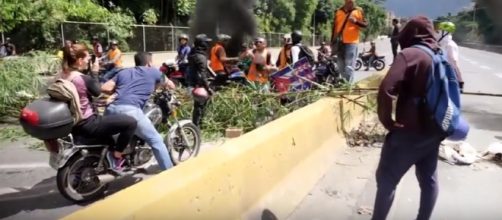Fear, pain, frustration, and anger are becoming an explosive combustible in Venezuela. The country is a hostage to the regime of Nicolas Maduro who is jealously snuggling up to the powers that be, losing sight of what people really need. In two days of the elections of the assembly who will rewrite the Constitution, violence has escalated and the death toll of violent anti-government protests has increased to 112 in the last four months of protests. Six victims died just in last two days of the general strike, officials confirmed.
'Maduro is irresponsible'
The government is only following the example of previous political and business elites, experts say. Dominic Waghorn, Diplomatic editor for Sky News considers that every Venezuelan government since the 50s 'has closely guarded control of the oil monopoly, and not delivered necessary political and economic reforms'. Furthermore Maduro 'mismanagement of the economy has been breathtakingly irresponsible,' he added. A recent decree ordered by interior minister Nestor Reverol banned protests and warned that anyone who marches against the electoral process and the Constituent Assembly risks up to 10 years in prison.
Evidence of human right violations
The state's prosecutor's office said they had evidence that Venezuelan security forces led by former head of the Venezuelan National guard, Antonio Benavides has been charged with 'serious and systematic' human rights violations.
Official forces used 'excessive force' against demonstrators, carried out raids without warrants, damaged property and tortured apprehended protesters On account of this, recently Benavides was removed from his post.
Despite restrictive measures, many young demonstrators have decided to join in anti-goverment protests. Nearly 3,000 people have been detained since the beginning of April.
Some are kept in prison regardless of being freed by a judgment order. The state's prosecutor's office said they had evidence that Venezuelan security forces led by Antonio Benavides used 'excessive force' against demonstrators, issued carried out rid without warrants, and more.
We are poor, we are angry and ill
Two rebels said to the BBC that poverty, hunger and the precarious state of their families health are the real reasons why they started the action.
"Sometimes we go through hard days, like coming back home and not having anything to eat," says Rodrigo. Last year 72 percent of population lost 20 pound (9 kilos) due to the lack of food.
"I used to have a normal life, where I could have drugs in my fridge in case of an emergency, but now I don't have anything" Armando (not real names) added. Venezuela reports that only 15 percent of medicines are readily available and many people had not been able to find the drugs they need in last six months.
A New Constitution for restoring peace (and Maduro)
On May 1 president Maduro announced his decision to call a referendum for a new Constitution sayng it was 'the only way to restore peace' in Venezuela.
Recently, The Guardian explained that isn't impossible that the president will back down under domestic and international pressure. But he has gone ahead with his plan despite the risk that there will is a chance that Chavismo will soon be entering a new more authoritarian phase'.
A new parliament without parties
The new Constituent Assembly to redraft National Constitution will be composed of 545 members: 364 will be chosen by local pools, and the remaining 181 members will be elected by members of seven social sectors (pensioners, indigenous groups, businesspeople, peasants and students). Parties have been removed from the process. The new body is expected to be heavily pro Maduro so the opposition outright rejects it and will boycott 30 July elections.
Maduro is a traitor
In addition to the opposition party the Attorney General, Luisa Ortega, one of the senior state officials, has taken sides in the battle of the new the Constituent Assembly. In a Financial Times interview she defined Maduro as 'fascist' 'traitor' and 'sellout' who has failed to preserve the rule of law, the constitutional order and peace'.
Francisco Toro, the editor of Caracas Chronicle explained the three reasons why Maduro is holding the vote: to dissolve and to remove the opposition, mobilize his base and consolidate power. Many opposition leaders accused Maduro of trying to centralise power and turn Venezuela into a dictatorship. The next presidential elections, which Maduro now seems likely to lose due to just 10 percent of popular support, are currently scheduled to be held in 2018. From this perspective, it is becoming increasingly clear why Maduro to have new rule of democracy.


